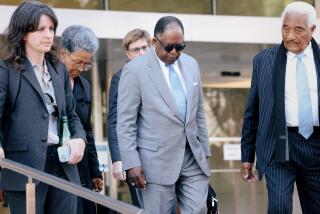<i> SHAKSPERE</i> SHAKEN BY MOOT COURT
- Share via
WASHINGTON — The Earl of Oxford never really had a chance. But the fact that he got to court at all, and acquitted himself as well as he did, was claimed by his supporters as a moral victory. So it may have been, and it may also have an effect on Shakespearean scholarship in the future.
The possibility that, despite the weight of tradition, the man from Stratford did not write the works of Shakespeare, can no longer be summarily dismissed as airy nonsense. Whether they were in fact written by Edward De Vere, 17th Earl of Oxford, the dashing, imprudent, frequently improvident, well-traveled, well-educated nobleman and close friend of Queen Elizabeth (Errol Flynn would have been perfect for the part) is another matter. But it is from here on a matter to be taken seriously.
It has all been wonderfully improbable. Here, beneath the high vaulted ceiling of Metropolitan Memorial Methodist Church, before its chaste marble altar, two learned law professors from American University, have argued before three black-robed Supreme Court justices whether Plaintiff De Vere, dead these 383 years, or Defendant Will Shakspere of Stratford, dead these 371 years, wrote the poems and plays. (Will never used the spelling Shakespeare.)
The participation of Justices William J. Brennan Jr., Harry A. Blackmun and John Paul Stevens made the moot court a media event. The pulpit was embraced by television cameras and still photographers, and there were at least a dozen pews full of word-persons. The church, which customarily seats 700 comfortably, had a standing-room-only crowd of closer to 1,000. Another 200 listened to the proceedings in the basement and dozens of others were turned away.
The lawyers, Peter A. Jaszi for De Vere, James D. A. Boyle for Shakspere, had written extensive and permanently valuable briefs, more than 100 pages long and festooned with footnotes and citations. Each man had 45 minutes to make his case before the judges and 15 minutes for rebuttal. The justices, Brennan, in particular, interrupted the presentations with sharp and frequent questions.
After a lunchtime recess, the justices returned to agree, in separate opinions, that the case for De Vere was, as a Scotch verdict puts it, not proved. The verdict was flashed to a waiting world like a ball score: 3-to-zip Stratford.
Yet the agreement was not tidy and total. Justice Brennan confessed that they were all “a little bit at sea,” confronting the wealth of evidence the lawyers had assembled. But Brennan was the most unequivocal in his rejection of the Oxford claims.
Blackmun admitted that he had greater doubts than Brennan about the authorship question, and added, significantly, that “even accepting the fact that Shakspere was not the author,” the Oxford case was not proved. Still, he said, Oxford is a more persuasive figure than any of the others who have been proposed. It was, said Blackmun, a matter for historians rather than the courts. The case, that is, is not closed.
There remains “a gnawing uncertainty” about the Shakespeare authorship, said Justice Stevens, and it is the uncertainty that has drawn people to the subject for years. And while he, too, found the Oxford case not proved during the moot court proceedings, “I do not think the contrary views (of the Shakespeare authorship) are totally frivolous.” He added that “I am persuaded that if (the author) weren’t William Shakspere, the best case is for Oxford.”
Stevens urged further research on the authorship question, including the crucial matter of when the plays were written. Oxford died in 1604, and a major Stratfordian argument against the Oxford claims is that some major plays, including “The Tempest,” were first produced after his death.
Stevens had some advice for the Oxford side. De Vere’s adherents, said the justice, must come up with a clear and concise statement of their case to present and defend. Specifically, they must address the crucial question of why a man concealed the authorship of the greatest body of literature in the English language.
Several people would have had to be involved in the cover-up. That suggests a conspiracy, Stevens said, and the Oxfordians ought not to be timid about using the word. The conspiracy, if such there was, “had to come from a command of the monarch or her prime minister.”
What was pleasing about the day’s work, Stevens also said, was that it reflected the adversarial system at its best, with arguments of high quality and the advocates showing respect for each other’s point of view.
Since the time serious doubts about the Stratford authorship were first voiced in the 18th Century, some five dozen candidates have been put forward, the majority of them neither deeply researched nor seriously pursued. Edward De Vere was first proposed in 1920 by an English scholar named J. Thomas Looney in “ ‘Shakespeare’ Identified.” The Encyclopedia Brittanica now names De Vere as the leading alternative to the Stratford man.
The Oxford case received a large boost from Charlton Ogburn’s scholarly, 892-page presentation “The Mysterious William Shakespeare” in 1984, documenting a remarkable number of congruences between De Vere’s life and the substance of the plays and poems.
One of Ogburn’s fascinated readers was a politically potent Washington philanthropist named David Lloyd Kreeger, a trustee emeritus of American University, who provided the financing for the event, persuaded the justices to take part and convinced Dr. Richard Berendzen, president of the university, to sponsor it.
The trial was taped in full by C-SPAN, which plans to air it on Thanksgiving Day. The wealth of the evidence for both sides remains buried in the dense but eloquent briefs, but the arguments themselves and the judicial opinions are society at its most civilized, a spectacle to be thankful for on any day.
More to Read
Sign up for Essential California
The most important California stories and recommendations in your inbox every morning.
You may occasionally receive promotional content from the Los Angeles Times.










